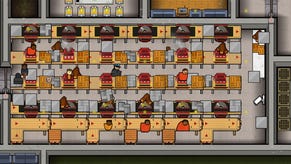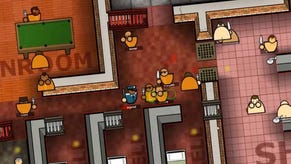$9 million and counting: why Prison Architect underlines a changing tide
Prison Architect is still in alpha, but it has netted developer Introversion Software over $9 million. VG247's Dave Cook speaks with co-founder Mark Morris to chat about the game's success and the model at large.
There was a time when publishers worked hard to convince the world of their relevancy. If you wanted to make a lot of money and get your games into as many hands as possible, you had to kneel before the might of such gate-keepers as EA, Activision and Ubisoft. That old image of the corporate suit promising gullible indies the Earth no longer applies, and it's games like Prison Architect that make that abundantly clear.
Founded in 2002 by Mark Morris and Chris Delay, the UK studio has had a rather unpleasant experience within the publishing enclave. On Xbox Live, the team was charged fee upon fee to get Darwinia+ on Microsoft's format, and with little in the way of marketing support, it proved to be a costly trial by fire. Every cloud has its silver linings however, and this off-putting experience convinced Morris and Delay to go it alone, and to make their bread without the interference of the blockbuster machine.
When I interviewed Morris about this ghastly experience, he told me at the time that Introversion was charged $10,000 for a single dev kit. I literally said, "bloody hell," to which he replied, "Yeah, it’s ridiculous, and it’s non-refundable once you’ve bought it. You’ve got to pay – I think our quality assurance bill was $30,000 for testing with Darwinia+, and it took four years to get the game certified to a standard that Microsoft wanted. It then sold rubbish. We hardly shipped any units on Xbox 360, compared to PC."
But here we are today, and Introversion's entirely self-published strategy sim Prison Architect has raised the duo over $8 million and it's technically not even out yet. Thanks to Kickstarter and simplified routes to market, the volume of independent teams making compelling titles without publishers is increasing. For further proof you need only look at Chris Robert's Star Citizen which, at the time of writing, has raised $31 million in crowd funding. The industry has clearly changed.
However, the Introversion story could have turned out quite different, as Morris explained in our recent email exchange. "During Prison Architect's early days things were pretty bleak for Introversion," he wrote. "We'd had to sack all the staff and Chris and I had seriously considered leaving the company. The flip side to this is that we had the opportunity to start completely afresh - we didn't have any baggage - no large staff or office bills, or existing contracts to fulfill. At the same time, humble bundle had recently launched and kickstarter was showing it's early signs of success.
"We could feel that there was something in this new way of thinking - that gamers want to help to make games, we just needed to figure out how to take these existing concepts and fuse them into something that'd work for us. We spent a lot of time arguing about how best to do it and ultimately settled on our kick-starter-esque website. We really didn't know how successful it would be, and we decided that we needed to sell 100 units in the first 24 hours to make it a viable project. We absolutely smashed this number and the rest, as they say, is history."
I appraised an early Prison Architect build last year, and I found it to be a complex, yet rewarding sim title. The cartoonish visuals belie the dark nature of the format. As a prison warden, it's your job to create your holding areas, recreation rooms and ensure the facility runs like clockwork. While its convicts may look almost cute by design, the reality is that they're horrible, dangerous people.
It's a neat aesthetic element that really pulls your thought process in different directions, and in some cases skews your morality. When you see one of the prisoners toddle off to the execution chamber, never to return, your perception of the game will likely change a little. Over a year later, the game is still receiving regular updates. It's currently up to alpha version 15. I asked Morris for his view on evolving the game to encourage new crowd investors and even more play-time, and if a full product release will ever happen.
"Ultimately we want to make a standalone game," he replied. "Everything is subservient to that goal. We're not interested in prolonging the alpha or 'sustaining interest' as such. We have a master work list of everything that we want to include in Prison Architect and we've adapted our development process so that we can release meaningful chunks of that work list around once per month.
"I liken the process to steering a oil tanker - we have our own vision for Prison Architect and we know the path we are heading in, however we keep a close eye on the forums, twitter and facebook accounts, and the thoughts and views of the community kind of act like tug boats nudging the tanker in one direction or another.
"I think it's important for us not to become a slave to the masses, but equally the community have a constant a positive influence on what we do. Great examples of feedback in motion are when we've released a feature and the fans hate it. Under our normal process we would have just continued with that feature and piled more stuff on top of it, but now bad stuff gets culled quickly."
Such features and content revisions would have proved costly under Microsoft. The ability to make changes to Prison Architect without incurring a sports car's worth in fees is surely refreshing, and allows for a great deal of community-led design. After all, the community are now Introversion's key investors. The method makes an obscene mount of sense, but could it ever apply to publishers in the 'AAA' market? "Maybe in five or ten years," Morris mused. "They tend to lag behind the drag curve a fair bit."
In fact, Morris feels that Introversion and publishers can't really learn anything from one another, not since Prison Architect has shown that it can succeed without them. That said, I asked him what he thought of Sony and Microsoft's new-found interest in catering to the self-published majority, and if he'd ever consider going back to that world. He replied, "We're definitely going to sit on the fence and see how things pan out. Never say never and Prison Architect is our most popular game to date and it may suit a console audience, but having been burnt before we're not going to be an early adopter."
There is one major triple-a player out there that Morris still believes in however, and that is - understandably - Valve. In closing our exchange, I asked him for his views on SteamOS, and if the company's efforts to bring PC gaming into the living-room could have a knock-on effect throughout the publishing arena. "I think Valve have been very clever here," he concluded. "They've picked a great time to throw the cat amongst the pigeons and be disruptive.
"I really hope that the Valve box'll find an audience, but it's really hard to predict these things. They seem to be doing everything right and I think they've got a great chance of success, but like all these things we'll just have to wait and see. It's pretty tough to be a platform holder which is why we like to stick to just making games"
With $8 million in the bank and every reason to be optimistic, I can see why Morris would want to stick to what he knows. Somehow, I get the feeling Introversion and the Star Citizen team aren't the only companies destined to reap the windfall of this democratised development environment. It's only a matter of time before another studio achieves the same level of success.
The question is; who will it be?


















.png?width=291&height=164&fit=crop&quality=80&format=jpg&auto=webp)